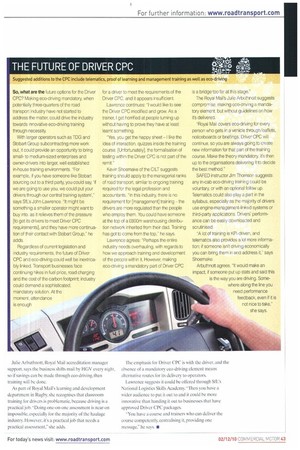THE FUTURE OF DRIVER CPC
Page 43

If you've noticed an error in this article please click here to report it so we can fix it.
Suggested additions to the CPC include telematics, proof of learning and management training as welt as eco-driving So, what are the future options for the Driver CPC? Making eco-driving mandatory, when potentially three-quarters of the road transport industry have not started to address the matter, could drive the industry towards innovative eco-driving training through necessity.
With larger operators such as TOG and Stobart Group subcontracting more work out, I could provide an opportunity to bring smallto medium-sized enterprises and owner-drivers into larger, well established in-house training environments. "For example, if you have someone like Stobart sourcing out to a third party, you could say, 'if we are going to use you, we could put your drivers through our central training system','' says SfL's John Lawrence, "It might be something a smaller operator might want to buy bto, as it relieves them of the pressure [to get its drivers to meet Driver CPC requirements], and they have more continuation of their contact with Stobart Group," he adds.
Regardless of current legislation and industry requirements, the future of Driver CPC and we-driving could well be inextricably linked. Transport businesses face continuing hikes in fuel price, road charging and the cost of the carbon footprint; industry could demand a sophisticated, mandatory solution. At the moment, attendance is enough for a driver to meet the requirements of the Driver CPC, and it appears insufficient.
Lawrence continues: "I would like to see the Driver CPC modified and grow. As a trainer, I get horrified at people turning up without having to prove they have at least learnt something.
"Yes, you get the happy sheet — I like the idea of interaction, quizzes inside the training course. [Unfortunately], the formalisation of testing within the Driver CPC is not part of the remit."
Kevin Shoemake of the CILT suggests training should apply to the managerial ranks of road transport, similar to ongoing training required for the legal profession and accountants. In this industry, there is no requirement for [management] training — the drivers are more regulated than the people who employ them. You could have someone at the top of a 2600m warehousing distribution network inherited from their dad. Training has got to come from the top," he says.
Lawrence agrees: "Perhaps the entire industry needs overhauling, with regards to how we approach training and development of the people within it, However, making eco-driving a mandatory part of Driver CPC is a bridge too far at this stage."
The Royal Mail's Julie Arbuthnott suggests compromise, making eco-driving a mandatory element, but without guidelines on how it's delivered.
"Royal Mail covers eco-driving for every person who gets in a vehicle through leaflets, noticeboards or briefings. Driver CPC will continue, so you are always going to create new information for that part of the training course. Make the theory mandatory. It's then up to the organisations delivering it to decide the best method."
SAFED instructor Jim Thomson suggests any in-cab eco-driving training could be voluntary, or with an optional follow up. Telematics could also play a part in the syllabus, especially as the majority of drivers use engine-management-linked systems or third-party applications. Drivers' performance can be easily downloaded and scrutinised.
"A lot of training is KPI-driven, and telematics also provides a lot more information; if someone isn't driving economically you can bring them in and address it," says Shoemake.
Arbuthnott agrees, "It would make an impact, if someone put up stets and said this is the way you are driving. Somewhere along the line you need performance feedback, even if it is not nice to take," she says.
































































































































